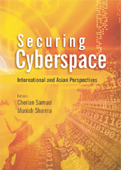Relevance of Cloud Computing for Defence
Technology has always played the key role in defining the outcome of war. A modern-day military is investing in cutting-edge technologies to leverage their benefits in the evolving nature of warfare, which encompasses every aspect of science. In the case of information and communication technology (ICT), the research and development has unleashed vast potential for civilian and military applications, which vary from simple logic execution to high-end supercomputing.
- Ajey Lele, Munish Sharma |
- April 2014 |














